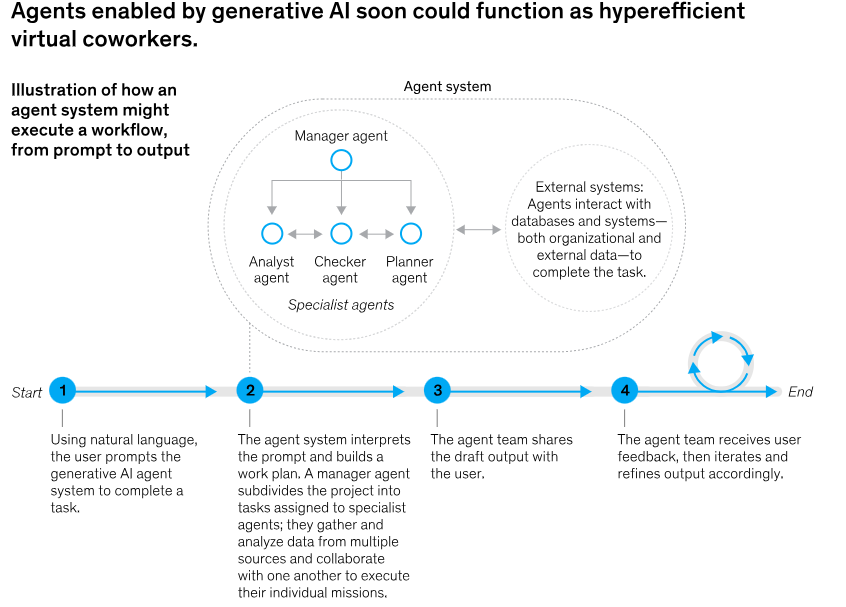Hey everyone, let’s talk about the future – a future powered by smart, super-efficient AI agents! Imagine a world where these Autonomous AI Agents are your tireless partners, not just following instructions but actually thinking, planning, and getting complex tasks done on their own.

Our Vision of an Agentic AI-Powered Future
- Boosted Creativity & Productivity: AI agents handle the routine stuff, freeing us up to focus on the exciting, creative aspects of our work. Think of it as having a super-smart assistant who can draft initial reports, organize data, and even brainstorm ideas with you.
- Seamless Workflows: Imagine AI agents that can manage entire processes from start to finish, coordinating different steps and even working with other AI agents. For example, in sales, an agent could identify leads, create personalized pitches, schedule meetings, and even handle initial negotiations – all autonomously.
- Hyper-Personalized Experiences: AI agents will understand individual needs like never before, leading to incredibly tailored customer service, learning experiences, and even personalized products and services.
- Solving Big Challenges: With their ability to process vast amounts of information and make intelligent decisions, AI agents can help us tackle some of the world’s biggest problems, from scientific breakthroughs to optimizing resource management.
It’s not just about making things faster; it’s about unlocking entirely new possibilities!
Reality Check: Where Are We Now?
Interestingly, at the recent Mobile World Congress (MWC), 2025 even though everyone’s talking about AI, the buzz is a bit “subdued because it’s like, ‘OK, we have agents, we have use cases, POCs [proofs of concept], but no scale yet. People had hoped that by this year, there would be a lot of scale”. So, while the potential is huge, we’re not quite seeing widespread adoption of these powerful AI agents just yet.

We’re still facing some significant hurdles on the path to this agentic AI utopia.
The Hiccups: Why Isn’t Our AI Butler Here Yet?
We’re still facing some significant hurdles on the path to this agentic AI utopia:
- Trust and Accuracy Issues: People worry about whether AI agents will make mistakes or be inaccurate. We need to be sure they’re reliable before we let them handle important tasks.
- “Black Box” Decisions: Sometimes, it’s hard to understand why an AI agent made a certain decision. This lack of explainability makes it difficult to identify and fix errors and build trust.
- Integration Challenges: Getting AI agents to work smoothly with existing systems and software can be a real headache. It’s not always easy to connect these new smart tools with the way we already do things.
- Skill Gaps: We need people with the right skills to build, manage, and work alongside these AI agents. Companies are still figuring out their AI hiring needs and how to train their current workforce.
- Data Quality Concerns: AI agents rely on good data to make smart decisions. If the data is messy or incomplete, the agents won’t perform well. As the saying goes, “no data, no AI”.
- Organizational Inertia: Change is hard! Sometimes, companies and employees are resistant to adopting new technologies and ways of working.
Our Belief: We Can Get There!
I firmly believe that if we tackle these challenges head-on, that exciting future I painted earlier is absolutely within reach. Technology is rapidly advancing, and people are actually more ready for AI than many leaders think. By focusing on building trustworthy, transparent, and well-integrated AI agent systems, we can unlock their immense potential.

Charting the Course: Potential Solutions
Here are some key steps we can take to make the rise of agentic AI a reality:
- Prioritize Trust and Safety: Implement robust testing, validation, and monitoring frameworks for AI agents. Focus on building “moderation” models to check outputs for risks.
- Embrace Transparency and Explainability: Invest in research and development to make AI agent decisions more understandable.
- Focus on Seamless Integration: Develop clear strategies for integrating AI agents with existing infrastructure and workflows. Consider “agent orchestration platforms”.
- Invest in Talent Development: Create comprehensive training programs to up-skill the workforce and develop AI-native talent. Encourage collaboration between technical teams and business users.
- Champion Data Excellence: Prioritize data quality and governance initiatives.
- Drive Change Management: Communicate the benefits of AI agents clearly and involve employees in the development and adoption process. Celebrate early wins to build momentum.
- Start with Focused Use Cases: Instead of trying to do everything at once, identify specific business problems where AI agents can deliver significant value and scale from there.
- Foster a Culture of Experimentation: Encourage employees to explore and experiment with AI tools to drive bottom-up innovation.
Ultimately, the rise of agentic AI isn’t just a technological shift; it’s a business transformation. It requires visionary leadership, a focus on people, and a willingness to rethink how work gets done.
What are your thoughts on the rise of agentic AI? What exciting possibilities do you see? Share your perspectives in the comments below! #AgenticAI #AI #FutureofWork #Automation #Innovation
At Zamun, we don’t just talk about the future—we help build it. Our smart marketing solutions are designed to leverage the power of emerging technologies like agentic AI to streamline your workflows, personalize customer journeys, and drive real results. We offer a range of marketing and branding services, led by top professionals who have decades of experience. We can help in driving your hyper personalisation efforts leading to more effective marketing and competitive advantage. Let’s co-create your AI-powered marketing future—get in touch today and see how we can help your business stay ahead of the curve.To know more about how we can take your organization to a higher orbit, visit Our Services Page or drop in an email to connect.
FAQs
Agentic AI can think, plan, and act more independently. It’s like going from a helpful tool to a smart teammate that can handle multi-step processes without constant human input.
AI agents make decisions based on the data they’re trained on and the rules or goals they’re given. While they’re getting smarter, they’re not perfect yet. That’s why trust frameworks, testing, and explainability features are crucial to ensure they act responsibly and transparently.
Automation bots follow predefined rules—like macros or scripts. Agentic AI goes beyond that. It can analyze situations, adapt to changes, and even collaborate with other agents or humans dynamically to reach a goal.
It’s a mix of things—tech readiness, trust, and change resistance. But perhaps the biggest challenge is organizational mindset. Companies need leaders who embrace innovation and teams that are open to re-imagining how work gets done.
Start with a clear goal—like improving lead engagement or increasing conversion rates. Then, pick a marketing process to automate or enhance (like email workflows or ad optimization), and integrate AI tools that align with your existing systems. Don’t aim to replace your team—aim to empower them.
Glossary
MWC: The Mobile World Congress (MWC) is a highly anticipated global event focusing on mobile technologies and the broader connectivity ecosystem. MWC 2025 took place in Barcelona, Spain, from March 3-6
POC: A Proof of Concept (POC) is a way to demonstrate the feasibility of a new idea, product, or process. It’s a simplified version of the intended final product or method, used to validate the core concept before committing significant resources to full development.
Sources
- What Is Agentic AI report, 2025 by Bain&Company
- How CIOs can scale gen AI Article, 2024 by McKinsey
- How COOs maximize operational impact from gen AI and agentic AI, Article by McKinsey, 2025
- Marketing’s New Middleman: AI Agents, Article by Bain&Company, 2025
- Highlights from Mobile World Congress, Podcast by McKinsey, 2025
- What is an AI agent?, Report by McKinsey, 2025
